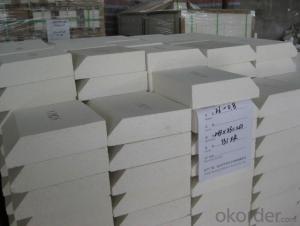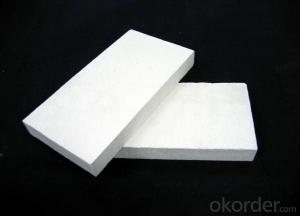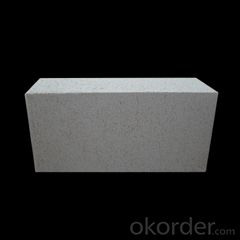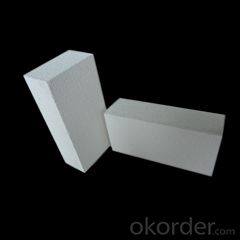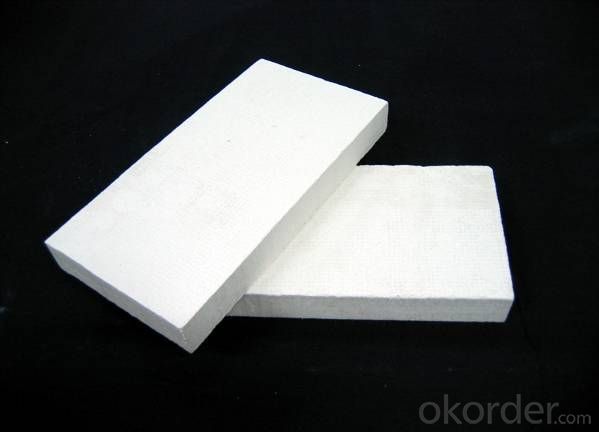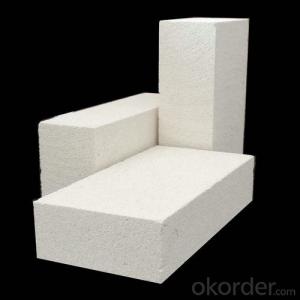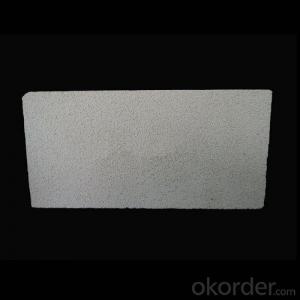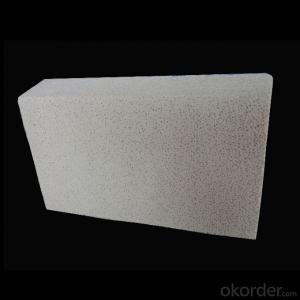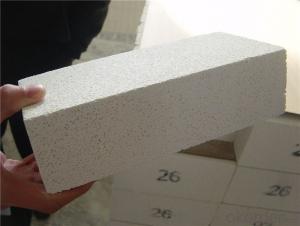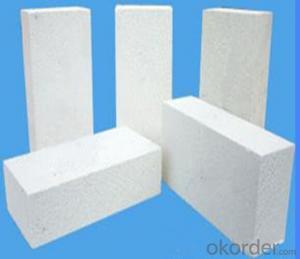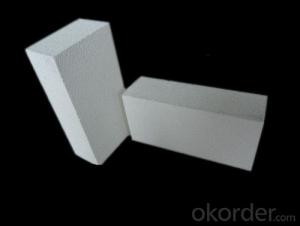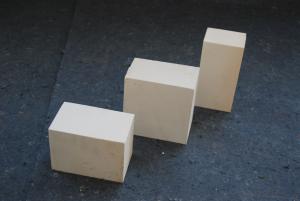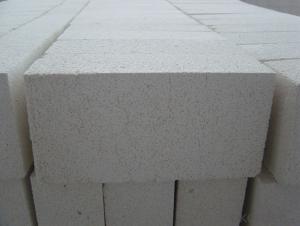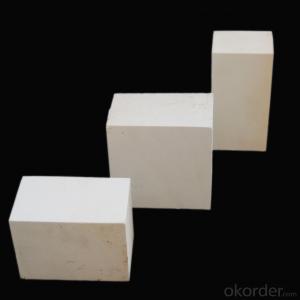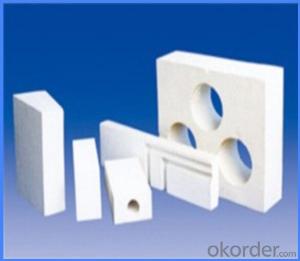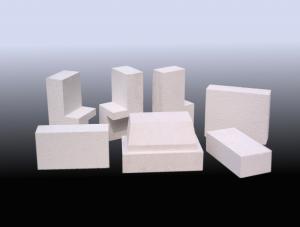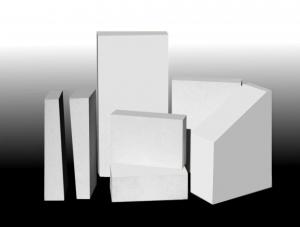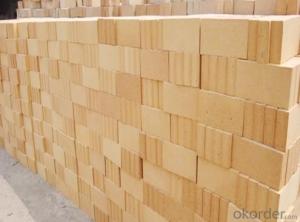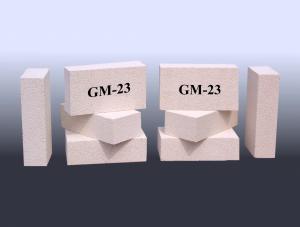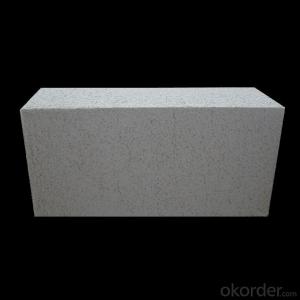Insulating Fire Brick - Refractory JM Mullite Insulation Brick B-2
- Loading Port:
- Shanghai
- Payment Terms:
- TT OR LC
- Min Order Qty:
- 10 m.t.
- Supply Capability:
- 100 m.t./month
OKorder Service Pledge
OKorder Financial Service
You Might Also Like
Refractory Mullite Insulating Fire Brick JM 23
OKORDER Series Insulating Bricks
OKORDER series insulating bricks are a kind of highly efficient, energy saving, low-carbon, environmental protection advanced products which are manufactured according to ASTM standard. OKORDER series products are the best lining and insulation materials in all types of industrial furnaces in the field of Metallurgy, Aluminum, Petrochemical, Ceramics, Power and Glass. They can be applied as heat insulation or no-melt erosion parts of the working layer. The products have been widely used in the following furnaces and achieved satisfactory results.
Application of Insulating Bricks
Metallurgy industry: Blast furnace, Hot blast stove, Reheating furnace, etc.
Petrochemical industry: Ethylene cracking furnace, Hydrogen production furnace, Primary reformer furnace, Reheating furnace, etc.
Ceramics Industry: Roller kiln, Pusher kiln, etc.
Glass industry: Glass furnace regenerator, etc.
Carbon Industry: Carbon roaster, etc.
Aluminum electrolytic industry: aluminum reduction cells,etc.
Other industries: Tunnel kiln, Shuttle kiln, etc.
Advantages of Insulating Bricks
Low Thermal Conductivity: More porosity brings excellent insulation effect, energy saving.
High Crushing Strength: High crushing strength under thermal state, volume stability.
Low Heat Storage: Little thermal storage when absorb more heat, energy saving effect is obvious.
High Purity: Low content of iron, alkaline and metal impurities.
Accurate Dimension: Precise brick size by machining, cutting and grinding special shapes, expediting bricklaying.
Picture of Insulating Bricks
FAQ
1. Which products do you have?
We have all kinds of refractory brick, castable, mortar, cement, ceramic fiber products, etc.
Or you could browse our products to choose what you need.
2. How do you control the products quality?
With strict quality control system throughout the materials selection and production process, our refractory and ceramic fiber products quality is effectively controlled to meet customer requirements.
From the raw materials selecting, our quality control begin. The quality certificates of raw materials are required and each batch will be tested before using. During production, the quality control are conducted by workers and then each piece will be sorted and examined by quality supervise.
3. Can you give me a brief introduction of the application of your products?
We are mainly specializing in the refractory materials in iron and steel, cement, glass, ceramics, petrochemical, electric power Industry, etc.
4. If I need your offer, what information do you need?
In order to choose suitable products, it will be appreciated to provide us the information, such us specification, technical data, order quantity, products application etc.
If any question, please contact us freely.
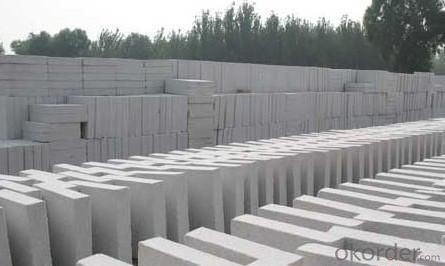
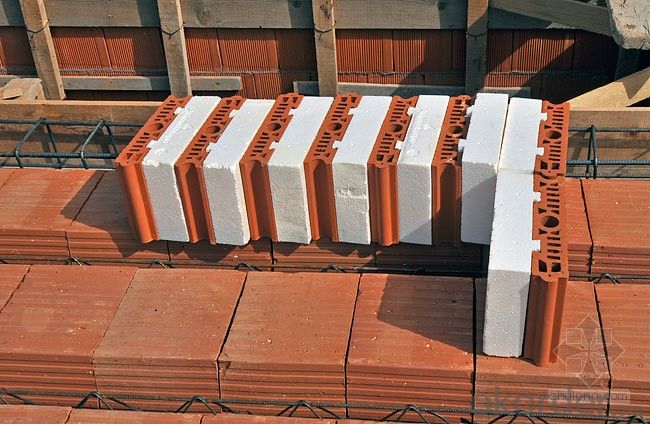

Application:
Insulation brick can be widely used for lining or insulation layers of various industrial furnaces and kilns in metallurgical industry, machine building industry, ceramic industry, chemical industry.
- Q: Are insulating fire bricks resistant to insect infestation?
- Insulating fire bricks do not possess specific resistance against insect infestation. They are primarily utilized for their thermal insulation properties in applications involving high temperatures, such as kilns, furnaces, and fireplaces. Although they are generally not prone to insect damage, they are not entirely impervious to it either. Insects can still infiltrate the bricks if they discover small cracks or openings in the material. Nevertheless, insulating fire bricks are typically dense and compact, thereby making it challenging for insects to burrow or establish nests within them. It is always advisable to employ preventive measures for managing and eliminating potential insect infestations in any construction material, including insulating fire bricks, to ensure their durability and effectiveness.
- Q: What are the different types of insulating fire bricks available in the market?
- There are several different types of insulating fire bricks available in the market. Some of the most common types include: 1. Lightweight Fire Bricks: These bricks are made from lightweight and porous materials, such as expanded clay, vermiculite, or perlite. They offer excellent insulation properties and are commonly used in applications where weight is a concern, such as for lining the walls of kilns or furnaces. 2. Ceramic Fiber Bricks: These bricks are made from ceramic fibers that are compressed and formed into bricks. They have high insulating properties, low thermal conductivity, and can withstand high temperatures. Ceramic fiber bricks are often used in applications that require high-temperature insulation, such as in the construction of industrial furnaces or ovens. 3. Calcium Silicate Bricks: These bricks are made from a combination of lime, silica, and reinforcing fibers. They have good thermal insulation properties and are resistant to thermal shock. Calcium silicate bricks are commonly used in applications where high-temperature insulation is required, such as in the construction of boilers or incinerators. 4. Magnesia Bricks: These bricks are made from magnesium oxide, which is a highly refractory material. They have excellent thermal insulation properties and can withstand extremely high temperatures. Magnesia bricks are often used in applications that require insulation in high-temperature environments, such as in the lining of steel-making furnaces or glass melting tanks. 5. Vermiculite Bricks: These bricks are made from expanded vermiculite, which is a naturally occurring mineral. They have good insulation properties, low thermal conductivity, and are resistant to high temperatures. Vermiculite bricks are commonly used in applications that require lightweight insulation, such as in the construction of chimneys or fireplace surrounds. Overall, the choice of insulating fire bricks depends on the specific requirements of the application, such as the desired level of insulation, temperature resistance, and weight considerations.
- Q: Can insulating fire bricks be used in electric furnaces?
- Indeed, electric furnaces can utilize insulating fire bricks. These bricks are intentionally engineered to possess a minimal thermal conductivity, rendering them highly suitable for situations necessitating heat containment or insulation. Electric furnaces necessitate insulation to thwart heat dissipation and enhance energy efficacy. Insulating fire bricks can endure extreme temperatures and possess exceptional insulation attributes, rendering them a fitting choice for electric furnace applications. Moreover, their lightweight nature and effortless installation make them a favored option for electric furnace insulation.
- Q: Can insulating fire bricks be used in boilers for residential heating?
- Insulating fire bricks can indeed be utilized for residential heating boilers. These bricks are specifically engineered to endure elevated temperatures and offer superior thermal insulation properties. Their utilization in boiler and furnace construction is widespread due to their remarkable heat retention capabilities and ability to prevent heat dissipation. Consequently, the incorporation of these bricks aids in enhancing the energy efficiency of the boiler system by minimizing heat transfer to the surroundings, resulting in more effective heating and reduced energy consumption. Furthermore, the durability and resistance to thermal shock exhibited by insulating fire bricks make them ideal for withstanding the intense temperatures and rapid temperature fluctuations typically encountered in boilers. Consequently, their implementation in residential heating boilers serves to enhance both performance and energy efficiency.
- Q: Can insulating fire bricks be used in high-temperature filters?
- Insulating fire bricks have the capability to be utilized in high-temperature filters. These bricks are specifically engineered to endure exceedingly high temperatures, typically reaching up to 3000°F (1650°C). They possess remarkable thermal insulation properties, low thermal conductivity, and high resistance to thermal shock, rendering them highly suitable for applications involving elevated temperatures. In the context of high-temperature filters, insulating fire bricks can be employed to construct the filter's framework, ensuring its endurance against the intense heat generated. These bricks can be arranged in such a manner that enables efficient filtration of gases or liquids while upholding their structural integrity under high temperatures. Additionally, the insulating properties of these bricks aid in minimizing heat loss and maximizing energy efficiency. Furthermore, insulating fire bricks often exhibit chemical inertness and possess commendable resistance to corrosive substances, thus making them appropriate for implementation in various industrial processes that entail the filtration of aggressive or hazardous materials at elevated temperatures. Overall, the utilization of insulating fire bricks in high-temperature filters offers a dependable and long-lasting solution for filtration applications that necessitate resistance to extreme temperatures.
- Q: Are insulating fire bricks suitable for insulation in steam boilers?
- Yes, insulating fire bricks are suitable for insulation in steam boilers. They are designed to withstand high temperatures and provide excellent thermal insulation, making them ideal for use in steam boilers to minimize heat loss and improve energy efficiency.
- Q: Do insulating fire bricks have good mechanical strength?
- Yes, insulating fire bricks have good mechanical strength. They are specifically designed to withstand high temperatures and provide excellent thermal insulation while maintaining their structural integrity.
- Q: Are insulating fire bricks suitable for applications with high mechanical stress?
- Insulating fire bricks are generally not suitable for applications that experience high levels of mechanical stress. They are specifically designed to offer exceptional thermal insulation and are constructed from lightweight materials like clay, ceramic fibers, or vermiculite. Despite their excellent insulation capabilities, they do not possess the same strength or durability as structural fire bricks or other refractory materials. When it comes to applications that involve heavy mechanical stress, such as robust furnaces, kilns, or industrial processes with significant movement or loading, fire bricks capable of withstanding these forces are necessary. These applications typically rely on dense fire bricks or refractory materials that exhibit greater compressive strength and resistance to mechanical stress. Opting for insulating fire bricks in applications with high mechanical stress can result in issues such as cracking, crumbling, or premature failure of the bricks. This compromises the system's integrity and efficiency. Therefore, it is crucial to carefully select the appropriate fire bricks or refractory materials that can endure the specific mechanical stress requirements of the application.
- Q: Are insulating fire bricks resistant to flame spread?
- Yes, insulating fire bricks are highly resistant to flame spread. These bricks are specifically designed to withstand high temperatures and effectively contain and insulate heat. They are made from refractory materials that have low thermal conductivity, which means they are excellent at preventing heat transfer and resisting flame spread. Insulating fire bricks are commonly used in applications such as kilns, furnaces, and fireplaces, where the ability to withstand and control high temperatures is crucial. Their resistance to flame spread makes them a reliable and safe choice for these types of environments.
- Q: Do insulating fire bricks have a high resistance to creep?
- Yes, insulating fire bricks generally have a high resistance to creep. The low thermal conductivity and high refractoriness of these bricks allow them to withstand high temperatures without significant deformation or creep.
Send your message to us
Insulating Fire Brick - Refractory JM Mullite Insulation Brick B-2
- Loading Port:
- Shanghai
- Payment Terms:
- TT OR LC
- Min Order Qty:
- 10 m.t.
- Supply Capability:
- 100 m.t./month
OKorder Service Pledge
OKorder Financial Service
Similar products
Hot products
Hot Searches
Related keywords
